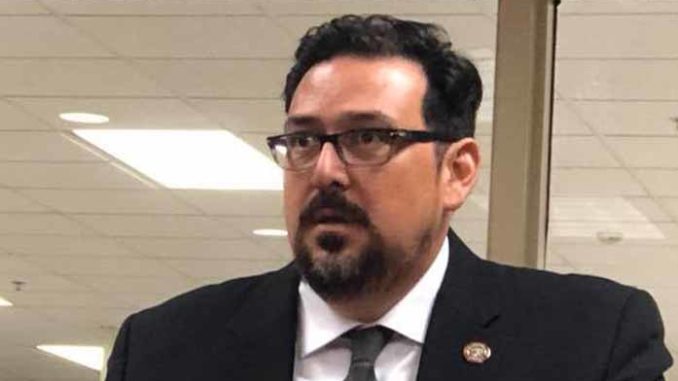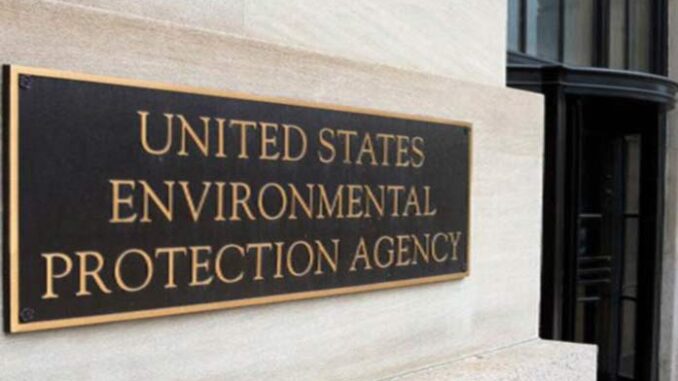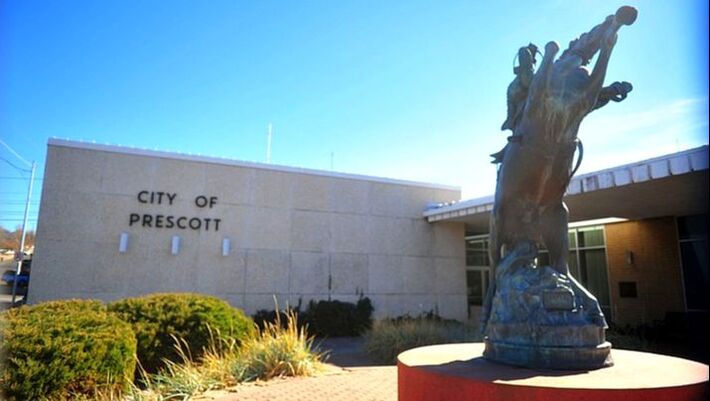
by Jonathan Eberle | Aug 9, 2025 | News
By Jonathan Eberle |
Arizona Public Service (APS), the state’s largest electric utility, announced Wednesday it will no longer pursue its previous pledge to achieve zero carbon emissions by 2050. The company also scrapped its interim emission reduction targets and removed a commitment to end coal-fired generation by 2031 from its website. The utility now aims to be “carbon neutral” by 2050 — a less stringent target that allows for continued fossil fuel use if emissions are offset through technology such as carbon capture.
“Our aspiration has evolved based on changes to energy markets and customer needs, and our plans are built around doing what’s right for the people and prosperity of Arizona,” said APS spokeswoman Jill Hanks in a statement to 12News.
The announcement quickly drew sharp criticism from environmental advocates, who accused the company of backing away from its public commitments. “APS is walking away from every clean energy promise it made to the public, to regulators, to shareholders, and to the communities it serves,” said Autumn Johnson, Executive Director of the Arizona Solar Energy Industries Association. “We are left with vague intentions and zero accountability.”
A free-market advocacy group also voiced concerns, though from a different perspective. The Arizona Free Enterprise Club argued that the new plan still comes with a heavy cost to consumers. “While this is modestly better than the carbon-free plan they have been pushing for the last five years, APS’ new ‘carbon neutral’ plan will still cost ratepayers billions,” said Scot Mussi, the group’s president. “The priority should be reliable and affordable baseload power for Arizonans, not meeting arbitrary carbon goals that require massive amounts of expensive wind and solar that will degrade the grid.”
Some of Arizona’s elected officials also weighed in. Arizona Governor Katie Hobbs criticized the decision on X, writing, “Arizona needs an abundance of energy, with a strong, and reliable grid to keep our communities safe and to continue our economic growth. This decision sets us back. It makes our air dirtier, hurts our growing clean energy economy, and forfeits the cost savings of renewable options.”
She continued, “I’ll be reaching out to APS to discuss their decision and reiterate that we must continue investing in new energy technologies and diversify our energy portfolio at the fastest rate possible.”
Hobbs’ response is interesting given her history with APS. After her inauguration, it was revealed that Pinnacle West Capital Corp., the owner of APS, donated $250,000 to Hobbs’ inaugural fund. The group also made a $100,000 donation in 2024 to Hobbs’ secret litigation fund.
Republican gubernatorial candidate, and sitting U.S. Representative, Andy Biggs offered a sharply different take than Hobbs, posting, “Every utility in our state should be prioritizing reliable and affordable energy for Arizonans, not trying to meet the demands of environmentalists pushing the Green New Scam that hurts Arizona businesses and families. As Governor, I’ll make sure Arizona aligns with President Trump’s energy agenda to help our economy flourish.”
APS data shows most of the state’s surging energy demand is coming from the expansion of data centers rather than residential growth. The company and its investors view the sector as a major opportunity for revenue.
While APS maintains it remains committed to expanding cost-competitive clean energy, the rollback represents a significant departure from the 2020 pledge.
Jonathan Eberle is a reporter for AZ Free News. You can send him news tips using this link.

by Jonathan Eberle | Aug 7, 2025 | News
By Jonathan Eberle |
The Arizona Court of Appeals is set to hear oral arguments on August 19 in a closely watched lawsuit challenging the state’s early ballot signature verification process—one that could reshape how election officials authenticate mail-in ballots. The case, Arizona Free Enterprise Club v. Fontes, will be heard by Division Two of the Court of Appeals, which lifted a prior stay in the case following a joint request by all parties to move forward on the merits.
At the heart of the dispute is whether the Secretary of State’s Elections Procedures Manual (EPM) has unlawfully expanded the scope of documents used to verify a voter’s signature on early ballot envelopes. The plaintiffs—Arizona Free Enterprise Club, Restoring Integrity and Trust in Elections, and Yavapai County voter Dwight Kadar—argue that Secretary of State Adrian Fontes and his predecessor, now-Governor Katie Hobbs, enforced EPM guidance that violates state law.
Under Arizona statute A.R.S. § 16-550(A), election officials are required to compare a voter’s early ballot envelope signature to the one in their “registration record.” However, the current EPM—originally authored by Hobbs in 2019 and maintained under Fontes—permits election officials to validate signatures by comparing them to any election-related document on file, such as early ballot requests, provisional ballot envelopes, or Active Early Voting List notices.
“The current election procedures manual adopted by the Secretary of State has rewritten state law regarding signature verification for mail-in ballots,” said Arizona Free Enterprise Club President Scot Mussi. “The result is a process that invites questionable methods and opportunities for abuse during the signature review process. It’s time for the courts to bring this illegal EPM practice to a halt.”
The case has had a turbulent procedural history. In 2023, Yavapai County Superior Court Judge John Napper initially ruled that the EPM violated state law, stating that the definition of “registration record” is neither vague nor ambiguous. Napper rejected the Secretary of State’s argument that the term could include any number of election-related documents. However, in a surprising reversal later in the proceedings, Napper ruled in favor of the state—prompting the plaintiffs to appeal.
The outcome of this case could have major consequences for how Arizona handles the verification of early ballots in future elections. Arizona is a state with widespread early and mail-in voting, and signature matching is often the sole method for confirming voter identity on ballots returned by mail. Early ballot voters are not required to provide other identifying information, such as a driver’s license number, date of birth, or the last four digits of a Social Security number.
After months of delays—including a stay prompted by a separate ruling that invalidated the 2023 EPM for procedural reasons—the Court of Appeals has agreed to resume the case. All parties have urged the court to issue a ruling on the merits, regardless of the Arizona Supreme Court’s handling of a related challenge filed by the Republican National Committee.
The court’s decision will help clarify the balance of power between Arizona’s elected officials and its election laws, especially in the increasingly scrutinized area of early voting.
Jonathan Eberle is a reporter for AZ Free News. You can send him news tips using this link.

by Ethan Faverino | Jul 30, 2025 | Economy, News
By Ethan Faverino |
The Trump administration recently unveiled a proposal to repeal the 2009 “Endangerment Finding,” a controversial U.S. climate policy that declared carbon dioxide and other greenhouse gases a threat to public health and welfare.
The Environmental Protection Agency’s (EPA) proposed rule, if finalized, would dismantle the legal foundation for numerous climate regulations under the Clean Air Act, repealing all resulting greenhouse gas emissions regulations for motor vehicles and engines.
EPA Administrator Lee Zeldin described the move as “the largest deregulatory action in the history of America,” arguing that the Endangerment Finding has been misused to impose costly regulations.
“There are people who, in the name of climate change, are willing to bankrupt the country,” Zeldin said. “They created this endangerment finding, and then they are able to put all these regulations on vehicles, on airplanes, on stationary sources, to basically regulate out of existence, in many cases, a lot of segments of our economy. And it cost Americans a lot of money.”
The proposal, which follows an executive order from President Trump, directs the EPA to review the findings’ legality. It is part of a broader push to roll back 31 environmental regulations.
Zeldin criticized the Obama and Biden administrations, saying they “twisted the law, ignored precedent, and warped science to achieve their preferred ends and stick American families with hundreds of billions of dollars in hidden taxes every single year.”
In states like Arizona, the Endangerment Finding has been used to enforce mandates and shut down energy sources that Arizona relies on.
The Arizona Free Enterprise Club celebrated the EPA’s proposal, viewing it as a critical step toward alleviating economic burdens imposed on Arizona families and businesses from overreaching environmental mandates.
The Club argues that the Endangerment Finding has forced the closure of reliable energy facilities and imposed costly environmental policies that have led to soaring utility costs and raised concerns about the reliability of the state’s energy grid.
Scot Mussi, President of the Arizona Free Enterprise Club, reacted to the Trump administration’s proposal, saying, “[The Endangerment Finding] has always been junk science used to shut down Arizona’s economy, close down our coal plants, and force our state into California-style green mandates. Repealing the Endangerment Finding is a necessary step to restore energy independence, protect ratepayers, and stop the unelected bureaucrats at the EPA from hijacking our economy in the name of climate alarmism.”
Ethan Faverino is a reporter for AZ Free News. You can send him news tips using this link.

by AZ Free Enterprise Club | Jul 18, 2025 | Opinion
By the Arizona Free Enterprise Club |
Following President Trump’s directive to scrub divisive Diversity, Equity, and Inclusion programs, practices, and language from public institutions, the U.S. Department of Education sent a letter to the Arizona Department of Education (DOE) to ensure that schools comply with these requirements.
The Arizona DOE notified every school district and charter public school that they must submit a completed certification confirming compliance with the federal civil rights law. A public website was developed to track which districts and schools have completed the certification and which have not. Though the majority of schools are listed as “in compliance,” the question remains: have they all truly purged their websites and learning environments of DEI practices? A quick review and some basic research suggest that not all these schools are fully committed to the removal of this woke material.
Alhambra Elementary School District in Phoenix has a subcommittee titled “Culture, Conditions, & Climate” with a stated need to “increase its Diversity, Equity, Inclusion capacity to ensure it is an inclusive environment.” The district plans to achieve this by subjecting staff to DEI trainings designed to establish that these adults teaching your children become anti-racist activists.
Recently, Scottsdale Unified School District has been the center of controversy surrounding their adoption of new textbooks that teach about George Floyd, Black Lives Matter, and anti-law enforcement rhetoric. Arizona Superintendent of Public Instruction Tom Horne has spoken out against this anti-American, DEI-infested curriculum, emphasizing that schools must steer clear of promoting an “unbalanced political agenda.”
In Glendale, the Washington Elementary School District has published a “Statement of Commitment to Educational Equity,” in which it outlines how DEI principles are integrated into its educational framework.
In an application for federal charter school start-up grants for 2024-2028, Desert Sage High School in Tucson declares its commitment to “diversity, equity, inclusion, anti-bias education, and social justice.” Among its goals is increasing the percentage of Hispanic and Native American students—an effort aimed more at virtue signaling just to demonstrate how unbiased they really are.
Several other schools maintain overreaching non-discrimination statements that include “gender identity” and “sexual orientation,” and some keep DEI in their mission statements.
And these are just the districts and schools that claim to comply with the federal civil rights law…
>>> CONTINUE READING >>>

by Ethan Faverino | Jun 30, 2025 | News
By Ethan Faverino |
The Prescott City Council has voted down a proposed General Plan on Tuesday, rejecting what critics said contained “woke policies.” If the proposal had been approved, it would have made its way to the ballot for the next election.
The proposed General Plan included policies such as Vision Zero, road diets, and pricey, unreliable energy. These were just a small part of the “woke proposal,” according to critics, that seemed to change the dynamic of the city, rather than shape the future in a way that reflects the community’s vision and priorities.
Vision Zero aims to eliminate all traffic deaths and injuries, which may seem noble on the surface, but is designed to ultimately eliminate the use of fossil fuel vehicles.
Road diets have a similar goal, reducing vehicle lanes to add bike lanes or wider sidewalks.
Prescott Mayor Phil Goode, along with two city council members, opposed the original proposal, citing its misalignment with the city’s conservative values and practical needs. Mayor Goode spoke strongly against this proposal, which he believed reflected policies that could transform the small, historic town into Los Angeles or San Francisco.
In the final vote, the original plan failed to obtain the five-vote supermajority needed to be referred to the ballot. A revised version, which made minor adjustments but retained many of the original policies, was also brought forward but failed again, this time with a 4-3 vote.
Prescott City Council is running out of time to agree on a General Plan that best describes the community’s needs for future development. If they do not vote and decide soon, they may likely miss the ballot for this fall’s general election.
Associate of Government Affairs for Arizona Free Enterprise Club, Mylie Biggs appaluded the move, saying, “This is a major win for the people of Prescott and the members of the Council that stood firm. Every other city in Arizona should be cautious of the language in their own General Plans and follow Prescott’s lead in rejecting wokeness in their cities.”
Ethan Faverino is a reporter for AZ Free News. You can send him news tips using this link.





